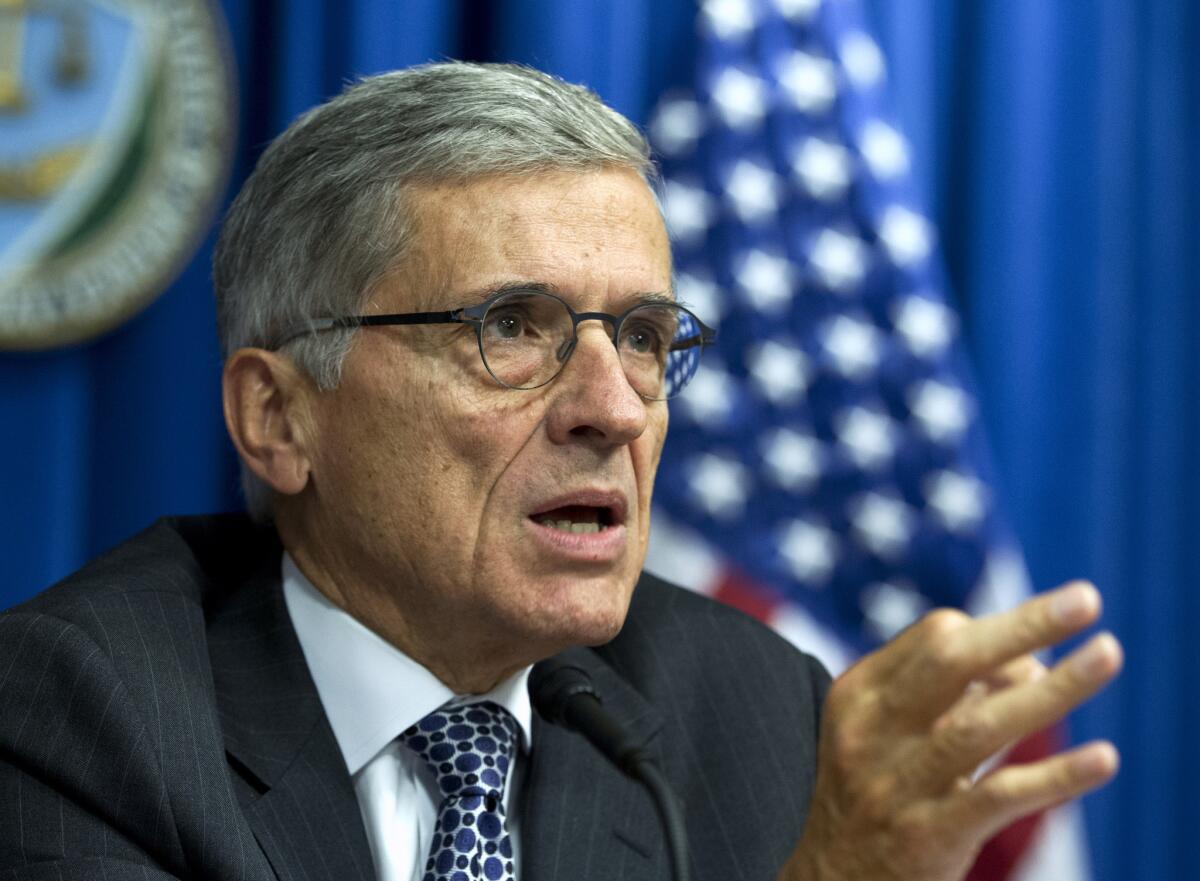FCC Chairman Tom Wheeler faces frosty crowd at INTX

In this Oct. 8, 2014 photo, Federal Communications Commission Chairman Tom Wheeler speaks during news conference in Washington. Wheeler unveiled a proposal for net neutrality, drawing howls from Internet service providers.
reporting from Chicago — Federal Communications Commission Chairman Tom Wheeler scolded telecommunications companies, saying they provide America with an increasingly vital public service -- the Internet -- and regulation is warranted for an industry that lacks sufficient competition.
“More competition would be better,” Wheeler said Wednesday during a speech from the Chicago stage of the Internet and Television Expo trade convention.
The FCC chief received a frosty reception at the gathering, which is hosted by the leading industry lobbying group, National Cable & Telecommunications Assn.
CEOs of cable companies, who were next to take the stage, lamented the FCC’s more hands-on approach to regulations for the Internet. The new FCC rules, adopted earlier this year by a divided FCC, come after decades of the federal government allowing the companies to operate in a less restrictive environment.
Michael Fries, chief executive of Liberty Global, said he was happy his company operated in Europe -- not the U.S.
“I am baffled by the chairman’s remarks,” Fries told the crowd. “There is a presumption of guilt and punishment for success that I’ve never seen before.”
Fries’ remarks prompted applause and cheers from the crowd.
The cable chiefs said they face plenty of competition. Charter Communications Chief Executive Thomas Rutledge, whose company wants to buy Time Warner Cable, told the group: “We, in the U.S., suffer from Stockholm Syndrome, and we have to be careful about what we think of our captors,” meaning the FCC.
The conflict is expected to play out in the coming months. Telecommunications giant AT&T and industry organizations, including the NCTA, have sued the government to try to block the FCC’s new Open Internet rules, which are scheduled to go into effect next month.
The new rules demand that broadband companies, such as Time Warner Cable, AT&T, Verizon and Comcast Corp., treat Internet traffic equally. Both sides pledge to support the same goals, but Wheeler noted the two parties don’t agree on the best means to accomplish the goal.
“The service that you offer is critically important to all Americans,” Wheeler told the crowd, acknowledging that cable operators’ business has dramatically changed in just the past year.
With those changes, he said, come new obligations and opportunities.
Wheeler’s appearance came just two weeks after Comcast Corp. and Time Warner Cable abandoned their 14-month effort to merge in the face of considerable resistance from Wheeler’s FCC and the U.S. Department of Justice.
Wheeler didn’t apologize, nor did he back down.
He made it clear that the two government agencies had separately concluded that a union of the nation’s two largest cable TV companies was not in the public interest. Comcast would have become a formidable gatekeeper if it controlled the so-called “last mile” of Internet connections in the nation’s largest cities.
The government’s scrutiny of the merger came amid a “tipping point” in the industry. Last summer, the number of homes with high-speed Internet subscriptions surpassed the number of households that pay for TV channels, Wheeler said.
“We recognized that the industry had changed and we saw concrete evidence of the new competition and business models made possible by high-speed Internet access,” Wheeler said. “We recognized that broadband had to be at the center of our analysis, and that video was, in essence, an application that flows over networks.”
Wheeler also prodded the industry to continue to invest in upgrading their networks so that more Americans can enjoy higher-speed service that is required for many uses, including streaming video.
The industry collectively spent $60 billion on upgrades to the cable and Internet networks last year.
“The Open Internet order was constructed so as to put broadband providers in a position where they could profit from the value of their investments, “ the FCC said.
But he didn’t seem swayed by the industry’s arguments that a more hands-on regulatory approach would be counterproductive because it could discourage companies from investing to upgrade their lines.
“Continue to invest and to innovate so that the United States has first class broadband transmission facilities,” Wheeler said.
“Second, to live up to the commitments that you have made in the Open Internet debate, to avoid discriminatory acts that will impair the value of broadband and the Internet to those who make use of its manifold possibilities,” Wheeler said.
The NCTA released a statement following Wheeler’s remarks, saying it appreciated that Wheeler used the show to talk about the importance of net neutrality.
“Cable is the largest broadband industry in America, and our networks are ushering in an exciting transformation of how consumers are enjoying content and experiencing new entertainment services,” the NCTA said.
In an awkward twist, Wheeler served as president of the NCTA -- back in the early 1980s.
But his transition from industry lobbyist to watchdog has rubbed many in the cable industry the wrong way.
Pat Esser, president of Cox Communications, which serves Orange and San Diego counties, just shook his head.
“I feel like we created this American dream and somewhere we got out of sync with the regulators,” said Esser during the CEO panel discussion. “We have to get back ... [to working] together.”
Twitter: @MegJamesLAT
More to Read
From the Oscars to the Emmys.
Get the Envelope newsletter for exclusive awards season coverage, behind-the-scenes stories from the Envelope podcast and columnist Glenn Whipp’s must-read analysis.
You may occasionally receive promotional content from the Los Angeles Times.










